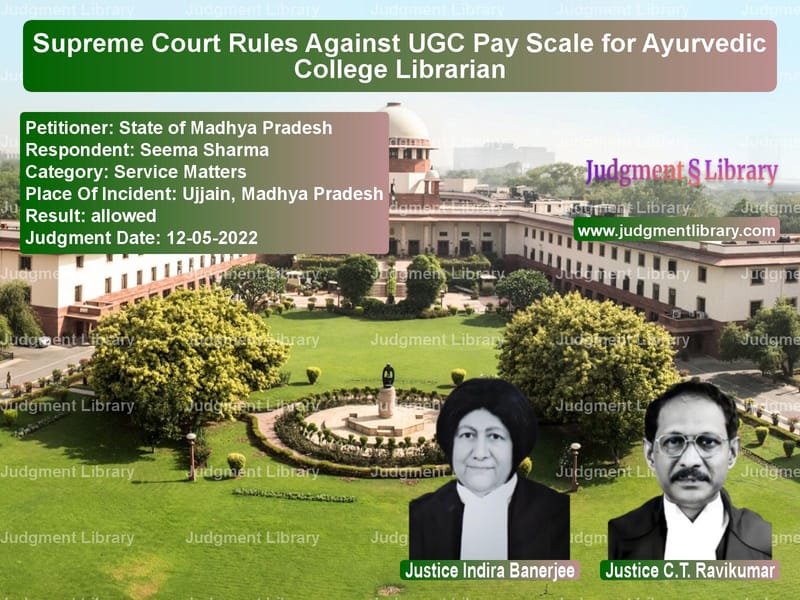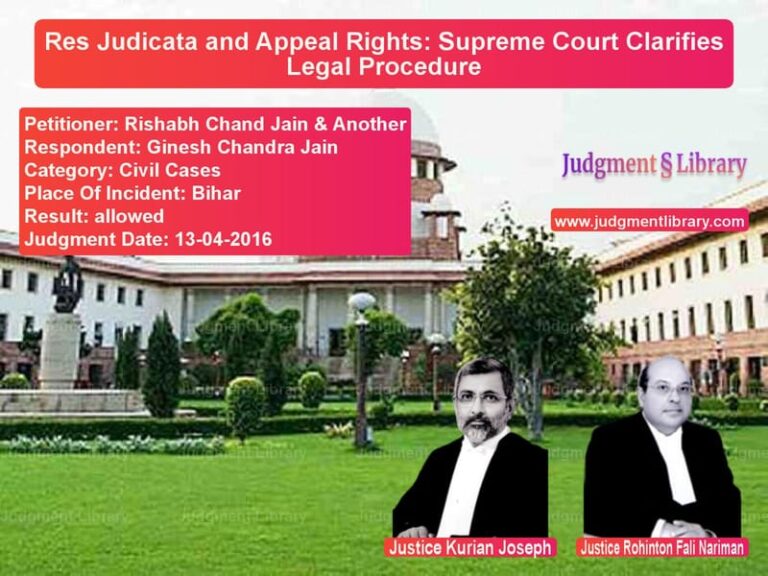Supreme Court Rules Against UGC Pay Scale for Ayurvedic College Librarian
The Supreme Court of India recently ruled in favor of the State of Madhya Pradesh in a dispute concerning the entitlement of a librarian to the University Grants Commission (UGC) scale of pay. The case, State of Madhya Pradesh vs. Seema Sharma, involved a librarian working at a government Ayurvedic college who claimed that she should receive the same pay scale as librarians in higher education institutions governed by the UGC. The Supreme Court set aside the High Court’s ruling, emphasizing that service rules specific to Ayurvedic colleges governed the respondent’s employment.
Background of the Case
The dispute arose when Seema Sharma was appointed as Librarian-cum-Museum Assistant at the Government Dhanvantri Ayurvedic College, Ujjain, on March 27, 1991. She was initially placed in a lower pay scale but later demanded the UGC scale of pay applicable to librarians in higher education institutions.
The timeline of events:
- 1991: Appointed as Librarian-cum-Museum Assistant in Government Dhanvantri Ayurvedic College.
- 1999: Completed eight years of service and requested the UGC pay scale.
- 2010: Filed a writ petition in the Madhya Pradesh High Court after her request was denied.
- 2016: The High Court ruled in her favor, directing that she be granted the UGC scale.
- 2022: The Supreme Court overturned the High Court’s ruling and denied her entitlement to the UGC pay scale.
Key Legal Issues
- Whether the UGC pay scale should apply to the respondent.
- Whether Ayurvedic colleges fall under the purview of higher education institutions governed by the UGC.
- Whether the Madhya Pradesh Education Service (Collegiate Branch) Recruitment Rules, 1990, were applicable to Ayurvedic college librarians.
Arguments by the Petitioner (State of Madhya Pradesh)
The state government contended that:
- The UGC pay scale applied only to institutions under the Higher Education Department, not Ayurvedic colleges under the Ayush Department.
- The respondent’s appointment was governed by the Madhya Pradesh Public Health (Indian System of Medicine and Homeopathy), Class-III, Clerical and Non-Clerical Services Recruitment Rules, 1987, and not the 1990 Rules that applied to higher education institutions.
- Ayurvedic colleges did not receive financial aid from the UGC, and thus, UGC pay scales were not applicable.
Counterarguments by the Respondent (Seema Sharma)
The respondent argued that:
- Her work and responsibilities were the same as those of librarians in higher education colleges.
- The 1990 Rules, which provided for UGC pay scales, should apply to her as well.
- She had completed the required years of service to qualify for the senior scale applicable to college librarians.
- Other librarians in similar roles had been granted the UGC pay scale, establishing a precedent.
Supreme Court’s Observations
1. Different Rules Govern Ayurvedic Colleges
“The 1990 Rules were applicable to institutions under the Higher Education Department. The Government Dhanvantri Ayurvedic College, where the Respondent was appointed, was not under the Higher Education Department but under the Ayush Department of the Government of Madhya Pradesh.”
The Court ruled that Ayurvedic colleges had their own service regulations and could not be placed under the same rules as institutions governed by the UGC.
2. No Precedent for Applying UGC Scales
“It is also well settled that there can be no equality to a wrong and/or illegality. Just because a librarian may have been erroneously granted the UGC pay scale, that would not entitle others to claim the UGC pay scale, if not applicable under the Rules.”
The Court rejected the argument that because some employees had received UGC pay scales in error, others could claim the same benefit.
3. Service Conditions Must Be Evaluated Separately
“The fixation of scales of pay is a matter of policy, with which the Courts can only interfere in exceptional cases where there is discrimination between two sets of employees appointed by the same authority, in the same manner, where the eligibility criteria is the same and the duties are identical in every aspect.”
The Court emphasized that different departments have distinct service conditions, and employees cannot claim pay parity based on similar job roles alone.
Final Judgment
The Supreme Court ruled:
- The High Court’s order granting the respondent the UGC pay scale was set aside.
- The respondent’s service conditions were governed by the 1987 Rules, not the 1990 Rules.
- The respondent was not entitled to the UGC pay scale as Ayurvedic colleges did not fall under the Higher Education Department.
Impact of the Judgment
This ruling has several significant implications:
- Clarification of Service Rules: The decision clarifies that Ayurvedic colleges do not come under UGC regulations.
- Prevention of Pay Scale Disputes: The ruling prevents employees from claiming UGC pay scales unless explicitly stated in applicable rules.
- Strengthened Government’s Authority: The Court upheld the state’s right to set different pay scales for different departments.
- Judicial Precedent: The ruling will guide similar cases where employees demand parity with UGC pay scales.
By delivering this judgment, the Supreme Court reinforced the importance of clear service regulations and ensured that pay scales are determined based on departmental rules rather than employee demands.
Petitioner Name: State of Madhya Pradesh.Respondent Name: Seema Sharma.Judgment By: Justice Indira Banerjee, Justice C.T. Ravikumar.Place Of Incident: Ujjain, Madhya Pradesh.Judgment Date: 12-05-2022.
Don’t miss out on the full details! Download the complete judgment in PDF format below and gain valuable insights instantly!
Download Judgment: state-of-madhya-prad-vs-seema-sharma-supreme-court-of-india-judgment-dated-12-05-2022.pdf
Directly Download Judgment: Directly download this Judgment
See all petitions in Employment Disputes
See all petitions in Public Sector Employees
See all petitions in Pension and Gratuity
See all petitions in Judgment by Indira Banerjee
See all petitions in Judgment by C.T. Ravikumar
See all petitions in allowed
See all petitions in supreme court of India judgments May 2022
See all petitions in 2022 judgments
See all posts in Service Matters Category
See all allowed petitions in Service Matters Category
See all Dismissed petitions in Service Matters Category
See all partially allowed petitions in Service Matters Category







